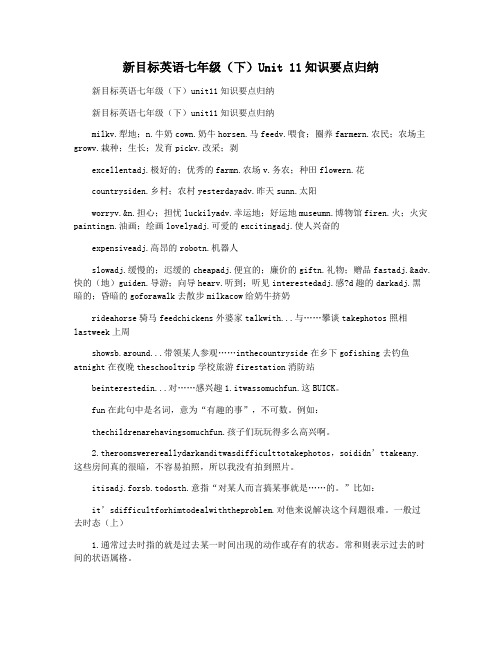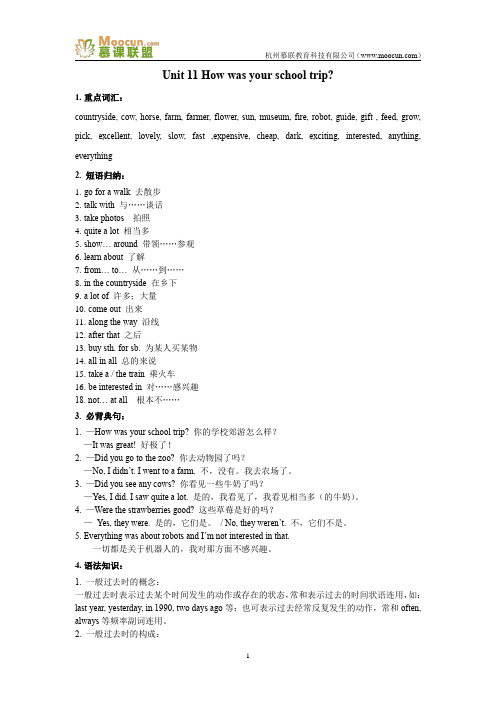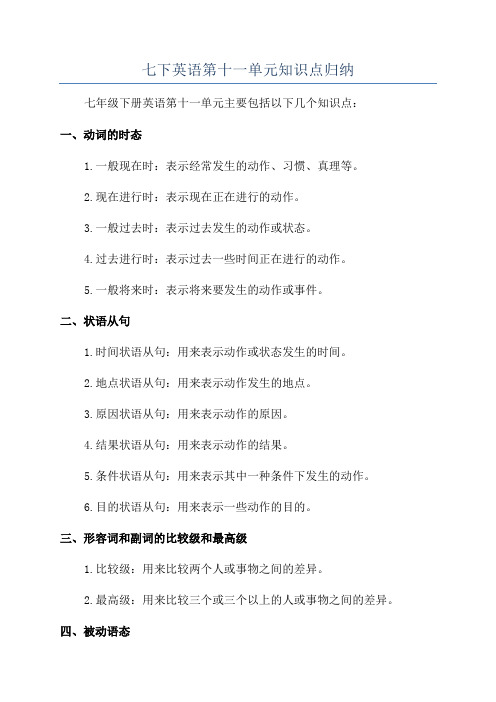七年级下英语第11单元资料
七年级下册英语十一单元知识点

七年级下册英语十一单元知识点Unit 11: English-Language ArtsIn the seventh grade English-language arts curriculum, unit 11 covers various key concepts and skills. This unit is designed to enhance students' reading comprehension abilities, vocabulary development, and writing skills. By exploring different genres of literature and engaging in meaningful activities, students will deepen their understanding of the English language. This article aims to outline the essential knowledge and skills covered in the eleventh unit of the seventh-grade English-language arts curriculum.1. Reading Comprehension:The first aspect of unit 11 focuses on enhancing students' reading comprehension skills. Students will learn how to analyze and interpret various texts, such as short stories, news articles, and poems. They will be introduced to strategies like summarizing, making predictions, identifying main ideas, and drawing conclusions. By practicing these skills, students will become more proficient readers, which will significantly contribute to their overall language development.2. Vocabulary Development:Building a strong vocabulary is crucial for language proficiency. In this unit, students will be exposed to a wide range of new words and phrases. They will learn how to use context clues to determine the meaning of unfamiliar words and expand their vocabulary through activities like word association, matching, and sentence completion exercises. Increasing theirword bank will help students express their thoughts more precisely and effectively.3. Writing Skills:Unit 11 also aims to enhance students' writing skills by providing them with opportunities to write different types of texts. Students will learn to compose descriptive paragraphs, personal narratives, persuasive essays, and informative reports. They will practice organizing their ideas, using appropriate transitions, and incorporating supporting evidence. Furthermore, students will receive feedback on their writing, allowing them to refine their skills and develop their unique writing styles.4. Grammar and Language Usage:To improve language fluency, students will focus on grammar and language usage throughout this unit. They will learn about sentence structure, subject-verb agreement, verb tenses, punctuation rules, and more. By understanding the fundamental components of English grammar, students will be able to communicate effectively and produce grammatically correct sentences.5. Speaking and Listening Skills:Developing effective speaking and listening skills is crucial for effective communication. In unit 11, students will engage in various speaking and listening activities, such as participating in group discussions, delivering presentations, and listening to audio recordings. These activities will help students practice active listening, improve their pronunciation and intonation, and express their ideas confidently in English.6. Literary Analysis:Unit 11 also introduces students to literary analysis techniques. They will explore elements of literature, including plot, setting, characters, conflict, and theme. Through analyzing texts, students will develop critical thinking skills, interpret literary devices, and appreciate different writing styles. This analysis will deepen their understanding of various literary works and enhance their overall appreciation of language arts.In conclusion, the seventh-grade English-language arts curriculum's eleventh unit covers a wide range of knowledge and skills. From reading comprehension and vocabulary development to writing skills and literary analysis, this unit aims to provide students with tools to become proficient English language users. By immersing themselves in various literary texts and engaging in meaningful activities, students will develop a deeper understanding and appreciation for the English language.。
初中英语七年级下册Units 11-12知识汇总

Unit 11 How was your school trip?一单元主题分析:本单元是七年级下册第11单元,标题为How was your school trip?话题为school trips ,功能是谈论past events,属于人与自我的范畴。
本单元谈论了学校组织的游览活动,由此二本单元和其他单元之间的联系:本单元初次涉及到一般过去时态,重点讲述了一般过去时的陈述句,否定句,一般疑问句与how 引导的特殊疑问句。
而在后面的U12会继续学习一般过去时的其他特殊疑问句。
一般过去时在初中阶段时很重要的时态,为后续学习过去进行时以及现在完成时打下基础。
四单元教学目标:1.能正确使用be动词的一般过去时描述或询问过去的状态。
2. 能正确使用实义动词的一般过去时描述或询问过去发生的事情。
3.能根据动词过去式推测动词原形,尝试归纳规则动词的过去式的特点及变化规律。
4.能通过阅读本单元两篇日记理解不同人对待同一事物的不同感受.5.了解国内外学校组织的各种游览活动。
Unit 12 What did you do last weekend?一单元主题分析:本单元是七年级下册第12单元,标题为What did you do last weekend?话题为Weekend activities,功能是谈论past events,属于人与自我,人与社会的范畴。
本单元谈论了常见的周末活动,由此让学生进一步掌握一般过去式的用法,尤其是一般过去二本单元和其他单元之间的联系:本单元是七年级下册的最后一个单元,从语法上来说,从语法上来说起到了承上启下的左云初次涉及到一般过去时态,重点讲述了一般过去时的陈述句,否定句,一般疑问句与how 引导的特殊疑问句。
而在后面的U12会继续学习一般过去时的其他特殊疑问句。
一般过去时在初中阶段时很重要的时态,为后续学习过去进行时以及现在完成时打下基础。
四单元教学目标:1.能够听懂关于谈论周末活动的对话内容,培养学生提取关键信息的能力2.用带有who, where, what等特殊疑问词的一般过去时的句子询问信息,并能做出正确的回答。
新目标英语七年级(下)Unit 11知识要点归纳

新目标英语七年级(下)Unit 11知识要点归纳新目标英语七年级(下)unit11知识要点归纳新目标英语七年级(下)unit11知识要点归纳milkv.犁地;n.牛奶cown.奶牛horsen.马feedv.喂食;圈养farmern.农民;农场主growv.栽种;生长;发育pickv.改采;剥excellentadj.极好的;优秀的farmn.农场v.务农;种田flowern.花countrysiden.乡村;农村yesterdayadv.昨天sunn.太阳worryv.&n.担心;担忧luckilyadv.幸运地;好运地museumn.博物馆firen.火;火灾paintingn.油画;绘画lovelyadj.可爱的excitingadj.使人兴奋的expensiveadj.高昂的robotn.机器人slowadj.缓慢的;迟缓的cheapadj.便宜的;廉价的giftn.礼物;赠品fastadj.&adv.快的(地)guiden.导游;向导hearv.听到;听见interestedadj.感?d趣的darkadj.黑暗的;昏暗的goforawalk去散步milkacow给奶牛挤奶rideahorse骑马feedchickens外婆家talkwith...与……攀谈takephotos照相lastweek上周showsb.around...带领某人参观……inthecountryside在乡下gofishing去钓鱼atnight在夜晚theschooltrip学校旅游firestation消防站beinterestedin...对……感兴趣1.itwassomuchfun.这BUICK。
fun在此句中是名词,意为“有趣的事”,不可数。
例如:thechildrenarehavingsomuchfun.孩子们玩玩得多么高兴啊。
2.theroomswerereallydarkanditwasdifficulttotakephotos,soididn’ttakeany.这些房间真的很暗,不容易拍照,所以我没有拍到照片。
人教版英语七年级下册单元Unit 11 知识点+测试卷+思维导图

Unit 11 How was your school trip?1.重点词汇:countryside, cow, horse, farm, farmer, flower, sun, museum, fire, robot, guide, gift , feed, grow, pick, excellent, lovely, slow, fast ,expensive, cheap, dark, exciting, interested, anything, everything2. 短语归纳:1.go for a walk 去散步2.talk with 与……谈话3.take photos 拍照4.quite a lot 相当多5.show… around 带领……参观6.learn about 了解7.from… to… 从……到……8.in the countryside 在乡下9.a lot of 许多;大量e out 出来11.along the way 沿线12.after that 之后13.buy sth. for sb. 为某人买某物14.all in all 总的来说15.take a / the train 乘火车16.be interested in 对……感兴趣18. not… at all 根本不……3. 必背典句:1. —How was your school trip? 你的学校郊游怎么样?—It was great! 好极了!2. —Did you go to the zoo? 你去动物园了吗?—No, I didn’t. I went to a farm. 不,没有。
我去农场了。
3. —Did you see any cows? 你看见一些牛奶了吗?—Yes, I did. I saw quite a lot. 是的,我看见了,我看见相当多(的牛奶)。
4. —Were the strawberries good? 这些草莓是好的吗?—Yes, they were. 是的,它们是。
人教版七年级英语下册Unit11课文+单词+知识梳理+词汇讲解+句型解析

人教版七年级英语下册Unit11课文+单词+朗读+知识梳理+词汇讲解+句型解析milk [mɪlk] v. 挤奶cow [kaʊ] n. 奶牛,母牛;母兽milk a cow给奶牛挤奶horse [hɔː(r)s] n. 马ride a horse骑马feed [fiːd] v.(fed/fed)喂养;饲养feed chickens喂鸡farmer ['fɑː(r)mə(r)] n.农民;农场主quite [kwaɪt] adv.相当;完全quitea lot(of…)许多anything ['enɪθɪŋ](常用于否定句或疑问句)任何东西;任何事物grow [grəʊ] v.种植;生长;发育farm [fɑː(r)m] n.农场 v.务农pick [pɪk] v.采;摘excellent ['eksələnt] adj.countryside ['kʌntrɪsaɪd].乡村;农村inthe countryside在乡下;在农村yesterday ['jestə(r)dei] adv.昨天flower ['flaʊə(r)] n.花worry ['wʌri] v.&n.担心;担忧luckily ['lʌkɪli] adv.幸运的;好运的sun [sʌn] n.太阳museum [mjuː'ziəm] n.博物馆fire ['faɪə(r)] n.火;火灾frie station ['steɪʃ(ə)n]消防站painting ['peɪntɪŋ] n.油画;绘画exciting [ɪk'saɪtɪŋ] adj.使人兴奋的;令人激动的lovely ['lʌvli] adj.可爱的expensive [ɪk'spensɪv] adj.昂贵的cheap [tʃiːp] adj.廉价的;便宜的slow [sləʊ] adj.缓慢的;迟缓的fast [fɑːst] adv.&adj. 快地(的)robot ['rəʊbɒt] n.机器人guide [gaɪd] n.导游;向导gift [gɪft] n.礼物;赠品all in all总的来说everything ['evrɪθɪŋ] pron.所有事物;一切interested ['ɪntrəɪstɪd] adj.感兴趣的be interested in… 对……感兴趣dark [dɑː(r)k] adj.黑暗的;昏暗的hear [hɪə] v.(heard/hɝ:(r)d)听到;听见Carol ['kærəl]卡罗尔(女名)【重点短语】1. school trip 学校旅行2. go for a walk 去散步3. milk a cow 挤牛奶4. ride a horse 骑马5. feed chickens 喂鸡6. talk with a farmer 与农民交谈7. take some photos 照相8. ask some questions 问一些问题9. grow apples 种苹果10. show sb. around sp. 带某人逛某地11. learn a lot 学到许多12. pick some strawberries 摘草莓13. last week 上周14.In the countryside 在乡村15. visit my grandparents 拜访我的祖父母16. go fishing 去钓鱼17. sound good 听起来很好18. climb the mountains 去爬山19. play some games 玩一些游戏20. visit a museum 参观博物馆21. visit a fire station 参观消防站22.draw pictures 画画23. go on a school trip 去旅行24 visit the science museum 参观科技博物馆25. how to make a model robot 如何制作机器人模型26. gift shop 礼品店27. buy sth. for sb. =buy sb. sth.为某人买某物28. all in all 总得来说29. be interested in... 对…感兴趣30. be expensive 昂贵的31. not...at all 一点儿也不【重点句型】1.---Did you see any cows? 你见到奶牛了吗---Yes, I did. I saw quite a lot. 我见到了而且见到了很多很多2. ---Did Carol take any photos? 罗尔拍照片了吗?---Yes, she did.是的,她拍了。
七下英语第十一单元知识点归纳

七下英语第十一单元知识点归纳七年级下册英语第十一单元主要包括以下几个知识点:一、动词的时态1.一般现在时:表示经常发生的动作、习惯、真理等。
2.现在进行时:表示现在正在进行的动作。
3.一般过去时:表示过去发生的动作或状态。
4.过去进行时:表示过去一些时间正在进行的动作。
5.一般将来时:表示将来要发生的动作或事件。
二、状语从句1.时间状语从句:用来表示动作或状态发生的时间。
2.地点状语从句:用来表示动作发生的地点。
3.原因状语从句:用来表示动作的原因。
4.结果状语从句:用来表示动作的结果。
5.条件状语从句:用来表示其中一种条件下发生的动作。
6.目的状语从句:用来表示一些动作的目的。
三、形容词和副词的比较级和最高级1.比较级:用来比较两个人或事物之间的差异。
2.最高级:用来比较三个或三个以上的人或事物之间的差异。
四、被动语态1. 被动语态的基本构成:be + 过去分词。
2.被动语态的用法:表示动作的承受者或行为的对象,强调动作的发生而不强调动作的执行者。
五、情态动词1. can:表示能力或许可。
2. must:表示必须或肯定。
3. may:表示可能或许可。
4. need:表示需要。
5. should:表示应该或建议。
6. would like:表示意愿。
六、宾语从句1.宾语从句是一种名词性从句,充当宾语的作用。
2. 宾语从句的引导词有that, if, whether等。
七、祈使句1.祈使句用来表示命令、请求、建议、劝告等。
2.没有主语,动词用原形。
以上就是七年级下册英语第十一单元的主要知识点归纳。
在学习中,我们要掌握动词的时态,熟练运用状语从句,掌握形容词和副词的比较级和最高级的用法,了解被动语态的构成和用法,掌握情态动词的用法,能够正确使用宾语从句和祈使句。
通过练习和巩固这些知识点,可以提高英语表达能力。
人教版七年级下册英语11单元知识点总结(一)
人教版七年级下册英语11单元知识点总结(一)前言人教版七年级下册英语11单元内容涉及重要知识点,本文将概括总结这些知识点,帮助读者加深对该单元的理解和记忆。
正文1. 词汇•单词记忆:通过词汇本和课文中的生词表,重点记忆和掌握本单元的单词,包括词义、拼写和音标等。
•常用短语:熟悉和运用本单元的常用短语,如”at the weekend”、“go shopping”等。
•数字表达:掌握数字表达法,如顺序数和基数词的用法,如第一、一百等。
•句型理解:重点掌握本单元中的常用句型,如一般现在时句型、疑问句、否定句等。
2. 语法•一般现在时:掌握一般现在时的基本句型、肯定句、否定句和疑问句的构成和用法,能够正确运用于日常生活中。
•物主代词:了解和掌握物主代词的用法和变化规律,能够正确使用其在句子中的位置和作用。
•地点介词:熟练掌握地点介词的常见用法,如in、on、at等,能够运用于描述地点或位置等方面。
3. 阅读•阅读技巧:了解并运用一些阅读技巧,如根据上下文猜测词义、根据关键词寻找答案等,提高阅读理解能力。
•阅读训练:通过课文中的阅读材料和习题,进行阅读训练,加深对课文内容的理解和掌握。
4. 口语交际•日常交际:通过角色扮演和对话练习,提高口语表达能力,灵活运用本单元所学的词汇和句型进行日常交际。
•真实情境:通过模拟真实情境和问答练习,培养学生运用英语进行实际交流的能力。
结尾本文对人教版七年级下册英语11单元的知识点进行了概括总结,包括词汇、语法、阅读和口语交际等方面。
通过对这些知识点的学习和掌握,读者能够提高英语综合能力,提升对本单元内容的理解和运用能力。
希望读者能够通过本文的指导,更好地掌握该单元的知识点。
1. 词汇•单词记忆:通过词汇本和课文中的生词表,重点记忆和掌握本单元的单词,包括词义、拼写和音标等。
•常用短语:熟悉和运用本单元的常用短语,如”at the weekend”、“go shopping”等。
人教版七年级下册英语11单元知识点总结
七年级下册英语unit11单元总结重点短语1.Go for a week 去散步k a cow? 给奶牛挤奶3.Ride a horse. 骑马4.Feed chickens. 喂鸡5.Talk with. 与……谈话6.Take photos. 拍照7.Quite a lot of. 许多8.Show Sb around. 带领某人参观9.Learn about. 了解10.From…two.... 从…..到11.Grow strawberries. 种植草莓12.Pick strawberries. 摘草莓13.In the countryside. 在乡下,在农村14.Go fishing. 去钓鱼15.At night 在夜晚e out 出来17.Go on a school trip 参加学校旅行18.Along the way 沿途.19.After that 之后.20.All in all. 总的说来。
21.Take a\the train. 乘火车22.Be interested in 对…感兴趣?.23.Not…at…all. 根本不…24.So much fun. 如此多的乐趣。
25.Fire station. 消防站26.Make a model robot. 制作机器人模型。
重点句型1.What did sb do? 某人做什么了?——What did carl do? 卡罗尔做什么了?——She picked some strawberries.她摘了一些草莓。
2.How was\were...? .....怎么样?——How was your school trip? 你的学校旅行怎么样?——It was great. 太棒了!3.Did. Sb. Do sth. 某人做某事了吗?——Did you go to the zoo? 你去动物园了吗?——No, I didn't. I went to a farm. 不,我没有,不我去农场了。
人教版七年级下册英语Unit 11单元知识点讲义(学生版)
七年级下册英语Unit 11知识点与语法精讲精练词汇梳理(一)完成单词梳理:名词:1. 奶牛 2. 马 3. 农民;农场主4. 乡村;农村5. 花6. 太阳7. 博物馆8. 火;火灾9. 油画;绘画10. 机器人11. 导游;向导12. 礼物;赠品动词:1. 挤奶 2. 喂养;饲养 3. 种植;生长;发育4. 采;摘5. 听到;听见代词:1. (常用于否定句或疑问句)任何东西;任何事物2. 所有事物;一切副词:1. 相当;完全 2. 昨天 3. 幸运地;好运地形容词:1. 极好的;优秀的 2. 使人兴奋的;令人激动的3. 可爱的4. 昂贵的5. 廉价的;便宜的6. 缓慢的;迟缓的7. 感兴趣的8. 黑暗的;昏暗的兼类词:1. (n)农场(v)务农;种田2. (v/n)担心;担忧3. (adv/adj)快地(的)(二)词汇变形小结:1.feed 喂养;饲养(v.) →____________ (过去式)2.farm 农场;务农(n./v.) →____________ (n.)农民;农场主3.grow 种植;生长;发育(v.) →____________ (过去式)4.lucky 幸幸幸(adj.)→ ____________(adv.)幸运地→ ____________(n.)运气5.paint 幸幸(v.) →____________(n.)幸幸幸幸幸→____________(n.)幸幸6.excite 幸……幸幸(v.) → ____________(adj.)使人兴奋的→ ____________(adj.)兴奋的;激动的7.love 爱(n.) → ____________(adj.)可爱的8.interest 使……感兴趣(v.) → ____________(adj.)感兴趣的→ ____________(adj.)有趣的9.hear 听到;听见(v.) → ____________(过去式)【练一练】用所给词的适当形式填空1.I ____________ (feed) some chicken with my grandparents yesterday.2.Your photos are ____________ (love). Do you want to see some of ours?3.My friends and I are ____________ (interest) in English.4.There are different kinds of ____________ (flower) in the park.5.The villager often ____________(grow) strawberries. His strawberries sell well.6.She was very ill, but ____________ (lucky) she is now out of danger.7.These ____________ (farm) are very friendly to us.8.I live on a farm. My mother ____________ (milk) a cow every day.9.I saw some beautiful ____________ (paint) in the art museum.10.Many boys in my class are interested in ____________ (play) soccer.(三)短语攻关:去散步给奶牛挤奶骑马喂鸡许多和某人交谈带某人参观……摘草莓在乡下;在农村去钓鱼爬山出现消防站进行学校旅行礼品店总的来说对……感兴趣一点也不知识点梳理1. Did you learn anything? 你学到什么东西了吗?【用法详解】anything是由any+thing构成的复合不定代词,意为“任何东西;任何事物”,常用于否定句、疑问句中。
人教版英语七年级下册Unit 11 单元知识点
一、词汇精讲1. exciting和excited ed修饰人,ing修饰物exciting是形容词,意为“令人兴奋的”,一般用来说明事物的特征。
例如:I like basketball. I think it’s very exciting.我喜欢篮球,我认为它非常令人兴奋。
excited是形容词,意为“感到兴奋的”,一般用来说明人的感受。
例如:He is very excited,because he get the first place.他非常兴奋,因为他得了第一名。
2. fast(1)fast作副词,意为“快地”,可以用来修饰动词或者动词短语。
例如:We got there so fast by subway.我们乘地铁很快到那儿。
(2)fast作形容词,意为“快的”。
例如:The man runs very fast.这个男人跑得非常快。
3. all in allall in all意为“总的来说”,常位于句首。
例如:all in all,it’s a great success.总的来说,它非常成功。
4. walk 名词,散步go for a walk = take/have a walk 走路,散步walk to + 地点名词(here/there/home不加to)5. quite与very辨析(1)quite需修饰动词、形容词、副词quite a/an + 形容词 + 单数名词“相当…的一个”(2)very常修饰形容词、副词a very + 形容词 + 单数名词“一个非常……的”quite a little + 不可数名词“相当多”quite a few + 可数名词“相当多”quite a lot “相当多”quite a lot + of + 可数或不可数“相当多”6. feed意为“喂养”,过去式fedfeed sth. to sb./sth. 把某物喂给某人或某物feed on 以………为生;以……为食feed……on/with 用……喂……7. How + be + 事物名词的用法?how意为如何,怎样●身体情况 How is your grandmother?●方式、方法 How did you come back home last night?●天气情况 How is the weather in Shanghai today?●程度 How do you like the book?8. show作动词,展示;show sth. to sb. = show sb. sth. 给某人展示某物作名词,节目;TV show电视节目;talk show访谈节目9. anything 任何东西;任何事物;常用于否定句或疑问句●anything作主语时,谓语动词用单数形式●形容词修饰不定代词something,anything时,形容词后置●something常用于肯定句中,但表示请求、建议、征求意见等,希望得到肯定回答的疑问句中常用something。
- 1、下载文档前请自行甄别文档内容的完整性,平台不提供额外的编辑、内容补充、找答案等附加服务。
- 2、"仅部分预览"的文档,不可在线预览部分如存在完整性等问题,可反馈申请退款(可完整预览的文档不适用该条件!)。
- 3、如文档侵犯您的权益,请联系客服反馈,我们会尽快为您处理(人工客服工作时间:9:00-18:30)。
• _√__ What did you see?
• ___ Did you learn anything?
• _√__ Did you ask him any questions?
• ___ Did you grow any apples?
2 Carol learned a lot about farming. T F
3 The farmers grow strawberries from Dec4 The farmers don’t grow apples. T F
5 Carol picked some strawberries
Q3. How was the weather there? It was great and the air was so clean.
Q4. Did Eric watch the stars at night?
Yes, he did.
Q5. What did Eric say about the stars?
They were beautiful.
1. I saw quite a lot.我看见许多(牛)。 quite adv. 相当;完全;十分;很 She sings quite well.她唱得非常好。 quiet a lot 相当多+of+可数或不可数, 也可以单独使用。 我们喝了不少酒。
We drank quite a lot of wine. 我看到了相当多的奶牛。
countryside
Grow种植
pick
worry
quite a lot
Pick 采.摘
showed Carol around the farm
grow apples
grow strawberries
grow rice.
2a Listen and check (√) the questions you hear.
and took them home.
TF
2c PAIRWORK
A: What did Carol do? B: She picked some strawberries.
A: How was your school trip? B: It was … (boring/interesting/good/great…) A: What did you do on the school trip? B: I went for a walk with my classmates.
chickens with my grandpa. It was so much fun. Peter: Sounds good. How was the weather there? Eric: It was great, and the air was so clean. I
watched the stars at night. They were so beautiful. Peter: Lucky you.
Read the conversation and answer the questions.
Q1. How was Eric’s trip last week?
It was excellent.
Q2.What did he do? He went fishing and fed the chickens with his grandpa.
I saw quite a lot of cows. 夏天我经常打网球。
I play tennis quite a lot in the summer. 不少学生迟到了。
Quite a few students were late.
How was your school trip?
(Section A 2a-2d)
Period 2 section A
(2a- 3a)
What did he/she do last weekend?
played volleyball played the guitar rode a horse
did some washingtalked with a farmer babysit his cousins
saw a lot of flowers
2d Talk about the picture.
① - How was Eric’s trip last week? ② - Who did he visit? ③ - What did he do on the farm? ④ - How was the weather there?
A: How was your school trip? B: It was great! A: Did you go to the zoo last weekend? B: Yes, I did. A: Did you see any crows ? B: Yes, I did. A: Were the crows good? B: Yes, they were.
2d Role-play the conversation.
Peter: Hi, Eric. How was your trip last week? Eric: It was excellent. I visited my grandparents in
the countryside. Peter: Oh, nice. What did you do? Eric: I went fishing every day. And I fed the
• _√__ Do they grow apples?
• ___ Did you eat them?
• _√__ Were they good?
2b Listen again. Circle T for true or F for false.
1 The farmer showed Carol around the farm. T F
